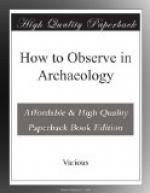Coins: thin gold, and silver, with Cufic inscriptions only (see XV, Fig. 21). Mounds of this period may be known by fragments of marble-carving with Cufic inscriptions, plasterwork, Arab and Persian vase and tile fragments in thick blue, green, yellow, or brown glaze, metallic lustre-glaze, &c., variegated glass bangles, and rings; bits of cloudy white glass (from lamps); fragments of wood, carved and inlaid with bone, nacre, &c., in geometrical patterns; textile fragments, (which are naturally not commonly found in older mounds), &c.
Nothing is said with regard to burials as these may not be touched.
[1] The limit of age which constitutes an ‘antiquity’ for legal purposes is fixed in most antiquity-laws at 1500 A.D.
APPENDIX
LAWS OF ANTIQUITIES
The following brief notes on the Laws of Antiquities in force in the various territories with which this book is concerned must not be taken as absolving the traveller from the necessity of consulting the full text of the laws. At the time of going to press, the Turkish Law presumably prevails in such parts of the Turkish Empire as are not occupied by the troops of the Entente; in the remainder, temporary regulations are in force which will doubtless be modified when the new governments are established; and it is possible that the Turkish Law itself may be brought into greater harmony with modern ideas.
The Greek Law of Antiquities.
[Greek], 24 July 1899, Athens, [Greek] 1889.
All antiquities found are the property of the Government and are controlled by an Archaeological Commission, consisting of the Ephor General of Antiquities and the ephors of the archaeological collections in Athens. Fixed antiquities must be reported by the discoverer to the Ephor General or one of the ephors of antiquities or other official. Damaging of ruins or remains of monuments is forbidden. Owners of the land on which portable antiquities desirable for the National Museums are found are compensated to the extent of half their value. Any person who finds antiquities on his land must report them within five days, on pain of confiscation. The same applies to any one who finds antiquities on another person’s land, or in any other way comes into possession of antiquities. Informers against breaches of the law are rewarded by the amount of the compensation due to those who keep the law. Objects not considered worth keeping by the Museums are returned to the owner of the land. Excavations, even on private property, must be authorized by the Ministry of Education. The Government has the right of expropriating land for purposes of excavation. In Government excavations, the owner of the land receives one-third of the value of the objects considered worth keeping by the Museums. Secret excavation is punished by confiscation of the finds, imprisonment and temporary loss of civil rights.




